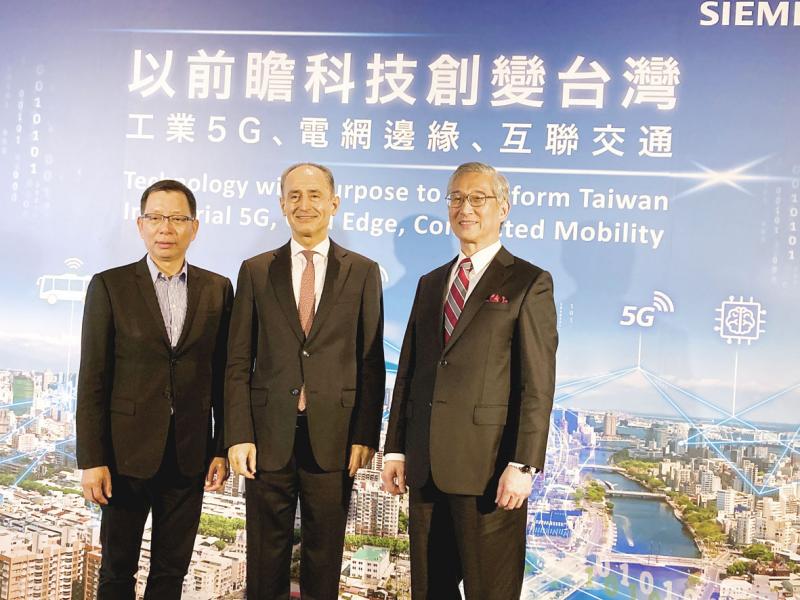Siemens Taiwan expects revenue growth to gather pace this year, benefiting from an uptrend in demand for its energy management solutions from local semiconductor companies and machine tool manufacturers, which were hit hard by the COVID-19 pandemic.
Revenue last year beat expectations as business activity returned to normal, thanks to the government’s fast and appropriate response to contain the pandemic, Siemens Taiwan president and chief executive officer Erdal Elver said on Tuesday in Taipei.
“Overall, we had a good year, backed by growth in different sectors, such as semiconductors and infrastructure,” Elver said. “We did better than planned.”

Photo: Lisa Wang, Taipei Times
Siemens Taiwan said that increased demand from local semiconductor companies helped offset declines in other sectors, mainly customers in export-oriented sectors such as machine tool companies, which slumped due to the pandemic.
Elver did not disclose the company’s growth rate last year, but the firm usually uses the nation’s economic expansion forecast as a benchmark.
“This year will be better than last year,” Elver said.
“We still benchmark Taiwan’s GDP [as our goal this year],” Elver said. “If Taiwan grows, we have to keep growing.”
GDP is forecast to expand at a faster rate of 4.64 percent this year, after posting a better-than-expected 3.11 percent growth last year, Directorate-General of Budget, Accounting and Statistics (DGBAS) data showed.
“Energy management and infrastructure should grow faster than last year. Also, industry is recovering,” Elver said. “If you look at Taiwan, [you would] see growth in semiconductors, electronic parts and goods, and industry, especially, machine tools.”
As a growing number of local firms, such as Taiwan Semiconductor Manufacturing Co (台積電), are moving to carbon neutrality and looking to renewable energy, Siemens has the technology and solutions to help them reduce emissions, Elver said.
In the infrastructure segment, Siemens last year provided Taiwan Power Co (台電) with its energy IP, a smart meter management system, with more than 3 million smart meters being installed across the nation by next year.
The smart meter management system ensures the stability of renewable energy power transmission and smart electricity transmission and distribution, the company said.
Siemens Taiwan derives its revenue from five categories: digital industries, smart infrastructure, mobility, health and energy management.

CHIP RACE: Three years of overbroad export controls drove foreign competitors to pursue their own AI chips, and ‘cost US taxpayers billions of dollars,’ Nvidia said China has figured out the US strategy for allowing it to buy Nvidia Corp’s H200s and is rejecting the artificial intelligence (AI) chip in favor of domestically developed semiconductors, White House AI adviser David Sacks said, citing news reports. US President Donald Trump on Monday said that he would allow shipments of Nvidia’s H200 chips to China, part of an administration effort backed by Sacks to challenge Chinese tech champions such as Huawei Technologies Co (華為) by bringing US competition to their home market. On Friday, Sacks signaled that he was uncertain about whether that approach would work. “They’re rejecting our chips,” Sacks

Taiwan’s exports soared 56 percent year-on-year to an all-time high of US$64.05 billion last month, propelled by surging global demand for artificial intelligence (AI), high-performance computing and cloud service infrastructure, the Ministry of Finance said yesterday. Department of Statistics Director-General Beatrice Tsai (蔡美娜) called the figure an unexpected upside surprise, citing a wave of technology orders from overseas customers alongside the usual year-end shopping season for technology products. Growth is likely to remain strong this month, she said, projecting a 40 percent to 45 percent expansion on an annual basis. The outperformance could prompt the Directorate-General of Budget, Accounting and

BARRIERS: Gudeng’s chairman said it was unlikely that the US could replicate Taiwan’s science parks in Arizona, given its strict immigration policies and cultural differences Gudeng Precision Industrial Co (家登), which supplies wafer pods to the world’s major semiconductor firms, yesterday said it is in no rush to set up production in the US due to high costs. The company supplies its customers through a warehouse in Arizona jointly operated by TSS Holdings Ltd (德鑫控股), a joint holding of Gudeng and 17 Taiwanese firms in the semiconductor supply chain, including specialty plastic compounds producer Nytex Composites Co (耐特) and automated material handling system supplier Symtek Automation Asia Co (迅得). While the company has long been exploring the feasibility of setting up production in the US to address

OPTION: Uber said it could provide higher pay for batch trips, if incentives for batching is not removed entirely, as the latter would force it to pass on the costs to consumers Uber Technologies Inc yesterday warned that proposed restrictions on batching orders and minimum wages could prompt a NT$20 delivery fee increase in Taiwan, as lower efficiency would drive up costs. Uber CEO Dara Khosrowshahi made the remarks yesterday during his visit to Taiwan. He is on a multileg trip to the region, which includes stops in South Korea and Japan. His visit coincided the release last month of the Ministry of Labor’s draft bill on the delivery sector, which aims to safeguard delivery workers’ rights and improve their welfare. The ministry set the minimum pay for local food delivery drivers at